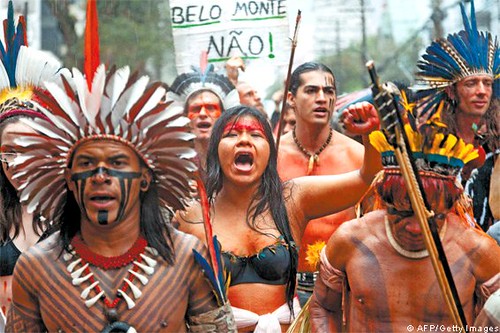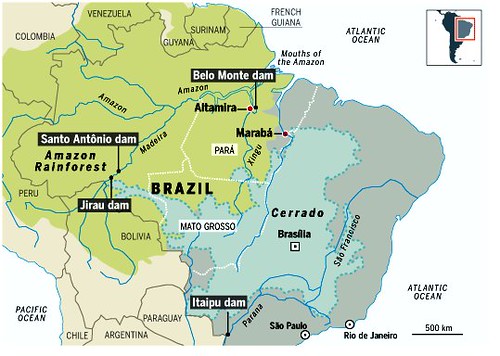
Amazon Day demonstration in Sao Paulo Brazil
An Amazonian battle
re-posted from Financial Times
You cannot miss the spot where the two Amazon activists were murdered.
Three months ago, José Claudio Ribeiro da Silva and his wife, Maria, were on their motorbike, trying to navigate a dilapidated bridge on a remote track outside the town of Nova Ipixuna in Brazil’s Pará state, when gunmen opened fire on them from the rainforest. A bullet went through Maria’s hand as she held her husband’s waist. The killers cut off one of Claudio’s ears as proof of their handiwork. Today, a plaque marking the site says: “The example they set in defending the forest will live on.”
Please respect FT.com's ts&cs and copyright policy which allow you to: share links; copy content for personal use; & redistribute limited extracts. Email ftsales.support@ft.com to buy additional rights or use this link to reference the article - http://www.ft.com/cms/s/0/eaaf7c08-cf02-11e0-86c5-00144feabdc0.html#ixzz1WPBYaeqU
“They were intolerant of people who wanted to clear the forest,” Claudelice Silva dos Santos, Claudio’s sister, says. Human rights lawyers allege their killers were hired by a local rancher who coveted the small jungle reserve they were trying to protect.
After a slowdown in deforestation in recent years, the future of the Amazon rainforest – the world’s largest, most of which falls within Brazil’s borders – is once again hanging in the balance. Before the end of this year, the country’s senate is expected to vote on a bill that, in its present form, promises an amnesty to landowners who illegally cleared land before June 2008. In March and April, deforestation rates surged sixfold as the bill made its way through the lower house, apparently in anticipation that this amnesty might be followed by others. Reports of violent conflict over land, an indicator of deforestation in the Amazon, have increased.
At stake for Brazil – the biggest exporter of coffee, orange juice, sugar and beef; the second largest of soyameal; and one of the countries most capable of supplying the increasingly voracious appetites of China and other Asian giants – is its reputation both as an emerging agricultural superpower and as a guardian of the global environment.
The Amazon “is part of Brazil’s status as a rising power along with its agricultural strength”, says João Augusto de Castro Neves, a Washington-based analyst and political editor of The Brazilian Economy magazine. “When you look at China, it has manufacturing; India has information technology. When you think of Brazil, you think of land, agriculture and food production.”
Lined up for battle are farmers in favour of the amnesty, worried about the cost of compliance with environmental laws. Ranged against them are environmentalists concerned that an amnesty will prove damaging in Brazil and beyond; as well a nascent sector of the investment industry seeking to monetise conservation of the forest.
Please respect FT.com's ts&cs and copyright policy which allow you to: share links; copy content for personal use; & redistribute limited extracts. Email ftsales.support@ft.com to buy additional rights or use this link to reference the article - http://www.ft.com/cms/s/0/eaaf7c08-cf02-11e0-86c5-00144feabdc0.html#ixzz1WPCfCzja
For President Dilma Rousseff – the centre-left Workers’ party president who has pledged to veto the amnesty, taking on her country’s powerful agricultural lobby – the issue poses a decisive early test. Her ability to manage a rebellious coalition as she seeks to match the performance of Luiz Inácio Lula da Silva, her successful and popular predecessor, will be watched closely by voters and investors alike.
One of Brazil’s successes in recent years has been a significant reduction in Amazon deforestation, combined with an increase in agricultural production achieved through technological advances. About 17 per cent of the forest has been cleared since the 1960s, the result mostly of cattle ranching. But after peaking at about 27,000 square kilometres in 2004, the annual deforestation rate declined to nearly 6,500 sq km last year (an area about four times the size of London).
Farmers’ advocates say convoluted changes in forest law imposed without consultation by successive governments have imposed heavy costs, financial and otherwise, on landowners. The Amazon forest cover requirement was increased from 50 per cent in 1995, for example. Without the amnesty, farmers will have to pay billions of Brazilian real in fines and reforest 60m hectares, compared with only 10m ha under the proposals, say lobbyists.
Please respect FT.com's ts&cs and copyright policy which allow you to: share links; copy content for personal use; & redistribute limited extracts. Email ftsales.support@ft.com to buy additional rights or use this link to reference the article - http://www.ft.com/cms/s/0/eaaf7c08-cf02-11e0-86c5-00144feabdc0.html#ixzz1WPCumoug
Satellite monitoring of forests, backed up by stronger law enforcement – particularly against larger farmers – was used to bring about the reduction. Agribusiness, such as soyabean exporters, followed up with a moratorium on produce from illegally cleared forest areas in 2006. Big beef exporters are following suit.
Environmentalists say further reductions will be harder to achieve. A clampdown on state loans to farmers who deforest, for instance, has not affected many smallholders, says Paulo Barreto of Imazon, a non-profit environmental research institution based in Brazil. “We are going to have to change our strategy on how to deal with the smaller offenders,” he says.
It was in the name of smallholders that Aldo Rebelo, a Communist party representative in the lower house, authored the bill. The proposals leave unchanged previous requirements for maintaining forest cover – 80 per cent in the Amazon and 20 per cent elsewhere. It is an amnesty for those who illegally cleared land before June 22 2008 that is proving to be the most controversial section.
“The fact that these changes were made by executive order turned farmers into criminals,” says Kátia Abreu, an independent senator and president of the Brazil’s agriculture and livestock confederation. Big agribusiness wants a unified forestry code to increase certainty for investors.
Few farmers groups advocate clearing the Amazon. Brazil’s emergence as an agricultural power has been focused in areas far from the region, as technological improvements have enabled cultivation of parts previously considered unsuitable. Grain output in the past 20 years has risen by just over 150 per cent, while the planted area has increased only 25 per cent. Analysts say that Brazil has at least another 20m ha of existing degraded land that could be farmed for crops, enough to cover what the world will need in the next decade without denuding the rainforest.
But environmentalists fear that the amnesty will embolden those who have already ignored limits on reducing tree cover to take more land. “In colonial times, you would deal with unrealistic decrees from Portugal by ignoring them and see if you could get away with it, and that’s continued till now,” says Philip Fearnside of the national institute for research in the Amazon (Inpa).
The debate comes amid rising uncertainty over changing weather patterns in the Amazon. Severe drought in 2005 was followed by record flooding in 2009 and drought last year. “If it gets a little bit drier and warmer, the forest here can disappear even without human interference,” says Rodolfo Salm of the university of Pará in the Amazon town of Altamira.
Scientists fear clearing could further disrupt the pattern of rain and evaporation by which moisture is recirculated through the region, with far-reaching effects. This system eventually feeds into weather patterns in the soya belt in Mato Grosso state in Brazil’s west; the sugar cane fields of São Paulo in the south; and even parts of Argentina.
The Amazon’s crucial role in regulating the global climate is strengthening the case for schemes and new business models that reward communities and landowners for sustainable management of their forests. One such project is the Brazilian government’s Amazon Fund, set up in 2008 with financing from Norway and Germany, which has approved 19 projects worth a total of $235m.
Following a different model is BioCarbon, a new company set up by Australia’s Macquarie Bank; the International Finance Corporation, the World Bank’s private sector investment arm; and US-based Global Forest Partners. The business will invest its $25m of equity in conservation projects that qualify for the UN’s Reducing Emissions from Deforestation and Forest Degradation scheme, starting with forests in Indonesia but also possibly including Brazil. These projects generate “Redd” forest carbon credits that BioCarbon can sell to third-party companies or investors seeking to offset their emissions.
Such schemes face many challenges – there is no global carbon trading system, for instance. Nonetheless, says Brer Adams, Macquarie Global Investments associate director: “Reducing deforestation is one of the most economically efficient things that can be done to cut emissions.”
In the near term, however, the Amazon’s future depends on Ms Rousseff`s ability to influence the coming senate vote. After the government was roundly beaten in the lower house, defeating the amnesty will pose a particularly tough challenge for a leader seen as a capable technocrat but holding elected office for the first time. Her last option will be to use her presidential veto. Izabela Teixeira, environment minister, says the proposed amnesty “sends a negative signal to society”. The federal government, she says, “is working hard to get adjustments and improvements in the text of the law and thus reduce the need to use the presidential veto”.
Please respect FT.com's ts&cs and copyright policy which allow you to: share links; copy content for personal use; & redistribute limited extracts. Email ftsales.support@ft.com to buy additional rights or use this link to reference the article - http://www.ft.com/cms/s/0/eaaf7c08-cf02-11e0-86c5-00144feabdc0.html#ixzz1WPD70BUT
Ms Rousseff will have to calculate whether this is a political battle worth fighting. She already faces problems controlling her unruly multiparty coalition, having lost four ministers since taking office in January, amid ethics and corruption scandals.
In addition the president, a developmental economist by training, has her own plans for the region – including building a dam system to boost the potential to generate hydroelectricity and drive economic growth. She will have to balance these concerns against environmental concerns at home and in export markets in developed economies.
“This bill is a big political test for Dilma. It will send signals to the world on where Brazil stands on the Amazon and the environment,” says Mr Castro Neves, the political analyst.
Yet no matter how it is achieved, better management of land in the Brazilian Amazon is an urgent priority not just for the environment but also for the region’s 24m inhabitants, a mix of Indians, ranchers, smallholders and poor labourers who have lived with constant conflict for decades.
No one knows this better than the families of the da Silvas, the slain activists. The municipality of Marabá, next to Nova Ipixuna, was in 2008 the fourth most violent in Brazil with a homicide rate six times that of the city of Rio de Janeiro, or 25 times that of the US. Most of these crimes go unpunished. Police identified two suspects in the da Silvas’ case but they escaped before a local judge issued a warrant for their arrest, the family says. According to human rights groups, since the da Silvas’ murder, four more people have been killed in land conflicts in in Marabá.
One of the da Silvas’ relatives, wearing a T-shirt with a picture of the deceased couple and the words “the forest is crying”, begins weeping herself as she appeals for justice. “We live in a Brazil where people can kill with impunity,” she says.
Additional reporting by Iona Teixeira Stevens







No comments:
Post a Comment